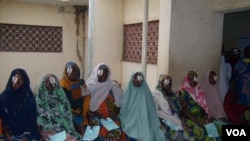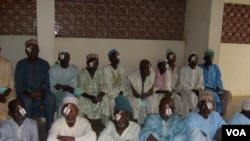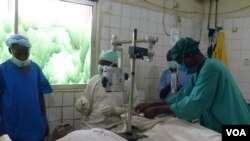KANO, Nigeria — In Nigeria, a national eye survey says there are over one million blind adults and about three million people who are visually impaired from avoidable causes.
Today, Standard Chartered Bank is working with the International Agency for Prevention of Blindness on a project called Seeing is Believing. The effort sponsors free cataract surgery for 46,000 sufferers and is training over 2,300 community health workers in areas of high need in the northern Nigerian town of Kano.
The General Hospital in Wudil Local Government Area in Kano State is one of many centers where cataract surgeries are being performed. Here, a team of ophthalmologists will remove cataracts from 250 patients before they move on to the next site.
Hajia Telle Wudil Sani, who is 56 years old, lives in the Ai Deshai section of the area and is one of the many beneficiaries of the Seeing is Believing program.
"I have this eye problem for about 30 years now, but I thank God things are alright with me now," she said. " I can see very clearly."
She said the surgery for both eyes including medication and a pair of sunglasses were free of charge. In comparison, private doctors in Kano town charge USD 225, or about 35,000 naira for the operation.
Dr. Mayor Atima, an ophthalmologist working with the project, said the process is simple. He said the doctor assesses the patient’s history to determine his or her ability to see and move around before being selected to receive surgery. The day after the operation, the patch is removed, and the patient is instructed on how to care for the eye while it heals.
Patients go back to the doctor after surgery to check for infection or inflammation.
Dr. Abuh Sunday Omogani, the medical director at the Ecclesial Church of West Africa in Kano, said his group is working through the humanitarian organization The Christofel Blind Mission to participate in the Seeing is Believing program
Omogani said diabetes, trauma, metabolic diseases and the side effects of drugs can cause cataracts but the most common cause is growing older.
He said as long as people are ageing, cataracts will continue to appear. That is why, he said, there’s a backlog of people who need eye surgery. He said the only thing doctors can do is keep with the number of people who need surgery today. .
Omogani said there is a large backlog in Kano and Jigawa States where the Seeing is Believing program is expected to provide cataract surgery for six thousand adults and 180 children annually for three years.
The project also includes an eye care awareness program including the causes and prevention of blindness, and the training of ophthalmologists, nurses, and community health workers.
He said a major component of the campaign is to warn the public of the dangers of one traditional way of treating a cataract called couching. During the procedure, a needle or other instrument is used to push the lens away from the pupil and into the back of the eye. It often leads to complications.
Babagana Kawule is financial manager at Standard Chartered Bank in Kano, which began supporting the cataract removal effort about nine years ago.
He said today, it’s investing approximately USD $960,000 [or about 16 million Naira] over three years in Kano and surrounding areas to achieve the following goals in an area of over nine million people.
He said the bank's efforts are reaching 1.4 million people with information and education campaigns. It's also providing surgery for over 46,000 people in need, and training over 2,300 community health workers to provide basic eye care services and ensure that more complex conditions are referred for further treatment.
So far, the effort has trained over 70 ophthalmologists how to perform small-incision cataract surgery, as well as over 200 support staff including counselors and other ophthalmic personnel.
The bank is supporting two projects in Nigeria: one in Abuja and Zamfara states with its partners; Sightsavers and International Center for Eyecare Education. Other efforts in Ibadan and Kano are jointly run with Chistofel Blind Mission International.
Today, Standard Chartered Bank is working with the International Agency for Prevention of Blindness on a project called Seeing is Believing. The effort sponsors free cataract surgery for 46,000 sufferers and is training over 2,300 community health workers in areas of high need in the northern Nigerian town of Kano.
The General Hospital in Wudil Local Government Area in Kano State is one of many centers where cataract surgeries are being performed. Here, a team of ophthalmologists will remove cataracts from 250 patients before they move on to the next site.
Hajia Telle Wudil Sani, who is 56 years old, lives in the Ai Deshai section of the area and is one of the many beneficiaries of the Seeing is Believing program.
"I have this eye problem for about 30 years now, but I thank God things are alright with me now," she said. " I can see very clearly."
She said the surgery for both eyes including medication and a pair of sunglasses were free of charge. In comparison, private doctors in Kano town charge USD 225, or about 35,000 naira for the operation.
Dr. Mayor Atima, an ophthalmologist working with the project, said the process is simple. He said the doctor assesses the patient’s history to determine his or her ability to see and move around before being selected to receive surgery. The day after the operation, the patch is removed, and the patient is instructed on how to care for the eye while it heals.
Patients go back to the doctor after surgery to check for infection or inflammation.
Dr. Abuh Sunday Omogani, the medical director at the Ecclesial Church of West Africa in Kano, said his group is working through the humanitarian organization The Christofel Blind Mission to participate in the Seeing is Believing program
Omogani said diabetes, trauma, metabolic diseases and the side effects of drugs can cause cataracts but the most common cause is growing older.
He said as long as people are ageing, cataracts will continue to appear. That is why, he said, there’s a backlog of people who need eye surgery. He said the only thing doctors can do is keep with the number of people who need surgery today. .
Omogani said there is a large backlog in Kano and Jigawa States where the Seeing is Believing program is expected to provide cataract surgery for six thousand adults and 180 children annually for three years.
The project also includes an eye care awareness program including the causes and prevention of blindness, and the training of ophthalmologists, nurses, and community health workers.
He said a major component of the campaign is to warn the public of the dangers of one traditional way of treating a cataract called couching. During the procedure, a needle or other instrument is used to push the lens away from the pupil and into the back of the eye. It often leads to complications.
Babagana Kawule is financial manager at Standard Chartered Bank in Kano, which began supporting the cataract removal effort about nine years ago.
He said today, it’s investing approximately USD $960,000 [or about 16 million Naira] over three years in Kano and surrounding areas to achieve the following goals in an area of over nine million people.
He said the bank's efforts are reaching 1.4 million people with information and education campaigns. It's also providing surgery for over 46,000 people in need, and training over 2,300 community health workers to provide basic eye care services and ensure that more complex conditions are referred for further treatment.
So far, the effort has trained over 70 ophthalmologists how to perform small-incision cataract surgery, as well as over 200 support staff including counselors and other ophthalmic personnel.
The bank is supporting two projects in Nigeria: one in Abuja and Zamfara states with its partners; Sightsavers and International Center for Eyecare Education. Other efforts in Ibadan and Kano are jointly run with Chistofel Blind Mission International.







